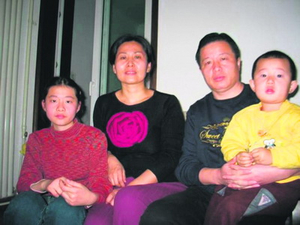Members of Gao Zhisheng's international legal team, on which I am privileged to work, have submitted a petition to the United Nations Working Group on Arbitrary Detention, urging the UN to declare that the Chinese government's detention of Gao violates international law. Our team hopes that the UN will decide accordingly, but also that the Harper government and opposition party leaders will speak out on behalf of this extraordinary human rights lawyer, who 'was disappeared' by the Chinese party-state over a year ago.
 China's rise is not happening in a vacuum. China depends on the rest of the world for the ingredients of its growing importance; it looks abroad for natural resources, export markets, and diplomatic legitimacy. Canada, as a significant trade partner and fellow member of the G-20, has an important role to play in shaping the path of Chinese ascension.
China's rise is not happening in a vacuum. China depends on the rest of the world for the ingredients of its growing importance; it looks abroad for natural resources, export markets, and diplomatic legitimacy. Canada, as a significant trade partner and fellow member of the G-20, has an important role to play in shaping the path of Chinese ascension.
But that role must not be defined by trade alone. Prime Minister Harper recognized this after taking office in 2006. "I think Canadians want us to promote our trade relations worldwide," he said. "But I don't think Canadians want us to sell out important Canadian values." And, in his first trip to China in December, he reiterated Canada's commitment to being a "vocal advocate and an effective partner for human rights reform" in China.
It is time to put these words into action. The Canadian government can begin by urging China to follow its own laws and release Gao Zhisheng or, at the very least, notify him and his family of the charges he faces.
Gao has been missing since Feb. 4, 2009, when security agents seized him from his ancestral home in Shaanxi province. More than one year later, he has yet to be charged with a crime. No-one has notified his family of the reasons and location of his detention- blatant violations of China's own criminal procedure laws.
Last month, the Chinese Embassy in Washington claimed that Gao is working in Urumqi in China's far West. But authorities have not provided any evidence of this (though a few patently doctored photos surfaced on the Internet); nor have they given any notice to his family. Canada should press China to verify Gao's supposed location and well-being.
To those of us who know Gao and his work, his detention by Chinese authorities was inevitable. His work on behalf of those persecuted for their religious beliefs brought the wrath of the Chinese government upon him. He was convicted in 2006 of "subversion," detained again in 2007 and horribly tortured. Gao's current unconscionable detention is even more terrifying; China experts say that even as Beijing has stepped up its crackdown of political dissidents, its near-complete silence on Gao Zhisheng is chilling and unprecedented.
Over the past decade trade with China it rose by $35.8 billion, or 340 percent. It is no mystery why trade is at the top of the agenda with China. But this is not unique to Canada. China's trade with nearly every country in the world is growing at exponential rates. And so far, nearly every country in the world has used trade as justification for dropping human rights from the agenda with China.
Canada can step into this void by speaking out about Gao Zhisheng. As the Speech from the Throne declared recently, "Our communities are built on the rule of law...Canadians want a justice system that delivers justice." We should also promote justice and the rule of law in China. With the disappearance of Gao and the imprisonment of other leading rights lawyers, Chinese authorities are clearly targeting lawyers, one by one, as key agents of change within China. And so, as with Gao, the authorities are stripping them of their licenses, shutting down their law firms, and imprisoning them.
It might already be too late for Gao Zhisheng. But if we have the courage to tell Beijing that its current culture of impunity cannot last, there may be hope for other rights lawyers, for the rule of law, and for justice to be delivered, in China as it is in Canada. All we need to ask is that China follow its own laws, and respect the rights guaranteed by its own Constitution. Is some amount of trade at stake? Perhaps. But so is the full measure of our conscience.
